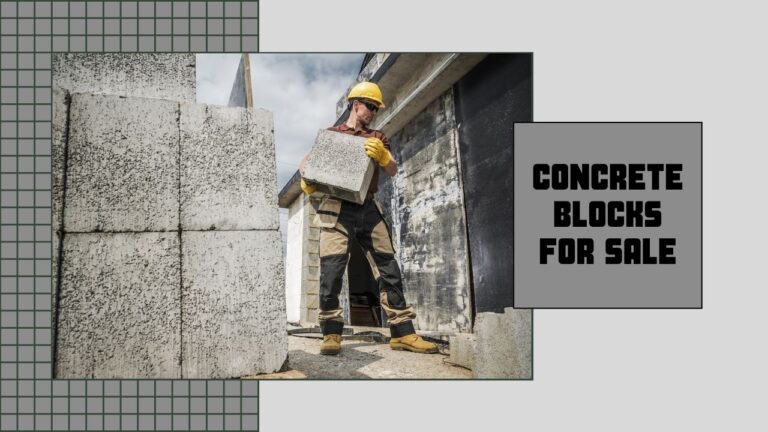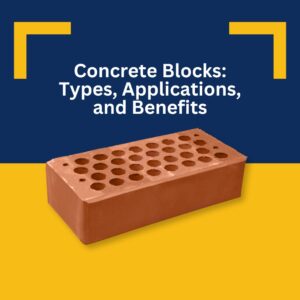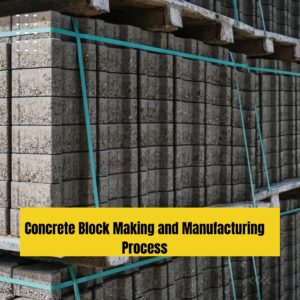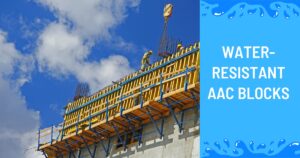Do you want to know more about Sustainable Concrete Blocks in Construction?
Concrete stands as the predominant building products for an array of structures, encompassing buildings, bridges, and roads. Yet, conventional concrete production exacts a notable toll on the environment, marked by substantial carbon emissions and the depletion of natural resources. In response, sustainable concrete emerges as a solution, mitigating these adverse impacts through the utilization of eco-friendly materials and inventive manufacturing techniques.
What is Sustainable Concrete Blocks?
Sustainable concrete is a revolutionary form of concrete that is crafted using alternative materials and methods specifically designed to mitigate its environmental footprint. In stark contrast to traditional concrete production methods that heavily utilize raw material and energy-intensive procedures, sustainable concrete places a paramount focus on eco-conscious practices across its entire manufacturing process. This proactive approach involves the integration of recycled elements like crushed concrete or glass, the use of alternative cementitious substances such as fly ash or slag, and the implementation of cutting-edge construction methodologies to minimize carbon emissions and preserve resources. Embracing sustainable concrete not only allows construction endeavors to notably diminish their ecological impact but also fosters enduring sustainability within the construction sector as a whole.
Benefits of sustainable concrete blocks
Sustainable concrete block present a host of advantages that encompass both environmental and practical aspects, making them a preferred choice in modern construction practices. Let’s delve deeper into the myriad benefits they offer:
Environmental Advantages: Sustainable concrete block crafted using recycled materials like fly ash and wood chips, reducing the demand for virgin resources and minimizing waste. By incorporating recycled aggregates and responsible sourcing practices, these blocks contribute to lower carbon emissions and overall environmental impact.
Energy Efficiency: These blocks provide excellent thermal performance, helping to regulate indoor temperatures and reduce the need for excessive heating or cooling. Their thermal mass properties enable buildings to retain heat effectively, enhancing energy efficiency and reducing reliance on artificial climate control systems.
Durability and Strength: Concrete masonry units are renowned for their superior compressive strength, ensuring structural integrity and longevity in construction projects. This durability not only enhances the lifespan of buildings but also reduces maintenance requirements, thus contributing to sustainable construction practices.
Versatility in Design: Sustainable concrete block offer architects and builders a versatile canvas to unleash their creativity. From intricate patterns to innovative shapes, these blocks can be customized to meet various aesthetic preferences while maintaining their structural integrity, adding a unique touch to sustainable building designs.
Contribution to Sustainable Construction: By utilizing sustainable concrete block, construction projects actively reduce their carbon footprint and support sustainable building practices. The incorporation of recycled materials and responsible manufacturing processes aligns with the goals of sustainable construction, making these blocks an ideal choice for environmentally conscious developments.
LEED and Green Building Certification: Structures erected utilizing sustainable concrete block have the potential to earn credits within green building certification initiatives such as LEED (Leadership in Energy and Environmental Design). This showcases a dedication to sustainability, potentially boosting property value in the process.
Local Economic Benefits: Incorporating recycled or alternative cementitious materials not only promotes sustainable construction but also plays a crucial role in supporting local industries and businesses. This practice helps boost economic growth and enhances the resilience of communities, creating a positive ripple effect on the environment and the economy simultaneously.
Types of Concrete Blocks:
There are two types of concrete blocks:
- Solid Concrete Blocks
- Hollow Concrete Blocks
1. Solid Concrete Blocks: Solid concrete blocks, which are hefty in weight and composed of aggregates, are essential building materials due to their strength, durability, and versatility. These blocks are made from a mixture of Portland cement, aggregate, and water, molded into solid rectangular shapes, and cured to achieve the desired strength. It is ideal for large-scale projects to use these solid blocks. They are compared to large bricks. As a result, concrete masonry construction takes less time than brick masonry.
2. Hollow Concrete Blocks: Hollow concrete blocks have become popular in construction due to their versatility, affordability, and insulation properties. These lightweight materials reduce labor costs and expedite the construction process, but also help to conserve cement and steel. In addition, these blocks decrease the overall weight of the masonry structure while enhancing sound and heat insulation. Standard hollow concrete blocks are available in full-size and half-size. The half-size blocks are cubic with one core, while the full-size blocks are rectangular and feature two cores. Hollow concrete blocks are available in various shapes, sizes, and designs, determined by their specific requirements and intended design.
- Concrete Stretcher Blocks: This positioning ensures proper alignment and stability when building walls or other structures using concrete stretcher blocks. The hollow design of the blocks helps reduce the overall weight of the structure while still providing strength and durability. Additionally, the parallel length design allows for easier installation and a more seamless finish in the final construction project.
- Concrete Corner Blocks: Concrete corner blocks are commonly used in masonry’s corners and the ends of windows and doors. One of the corner blocks is plain, while the other features a stretcher design. These concrete corner blocks are strategically positioned so that one end with a flat surface is exposed to the exterior. The plain corner block is then securely attached to the stretcher block, ensuring stability and structural integrity.
- Lintel Blocks: Lintel blocks are connected to create lintel beams. These beams offer structural stability by transferring the weight from above the beam to the walls on both sides of the entryway. Additionally, they are prefabricated and constructed using pre-stressed concrete.
- Concrete Pillar Blocks: Concrete pillar blocks, also called double corner blocks, are utilized when both corners are exposed. These blocks are commonly employed in constructing pillars and piers due to their plain appearance. The name “concrete pillar blocks” accurately reflects their purpose and usage.
- Partition Concrete Blocks: Partition concrete blocks are comparable to concrete pillar blocks, with the distinction that partition concrete blocks, also referred to as partition blocks, have a greater height than width. The hollow section of a partition block is divided into two or three segments. These blocks are ideal for constructing partition walls. They provide a practical and efficient solution for dividing spaces and creating separate areas within a building.
- Jamb Concrete Blocks: Jamb blocks are fundamental when walling a complex window. They provide stability and support for the window frame, ensuring it is securely in place. Jamb concrete blocks are durable and sturdy, making them ideal for long-lasting construction projects. Their precise measurements and design make them easy to install and work with during the building process.
- Bullnose Concrete Blocks: Concrete Pillar Blocks and Bullnose Concrete Blocks are identical. The main difference between these two concrete block types is their angles. Bullnose blocks have rounded corners, which concrete pillar blocks do not have. Bullnose concrete blocks may be the best choice for you if you want blocks with rounded edges.
- Paving Blocks: Paving blocks are rectangular or square reinforced concrete structures. They serve as decorative elements for paving. Paving blocks are extensively employed in the construction of roads and can also be utilized for constructing parking lots and footpaths. Paving blocks must be painted with high-visibility paint for road shoulders and paving so drivers and motorists can see them.
- Light Aerated Concrete Blocks: Light aerated concrete blocks are manufactured using a mix of Portland cement, high-quality sand, aggregate, and other materials. The aerated concrete technology used in the production process ensures that these blocks are lightweight and have excellent thermal insulation properties.
- Fly Ash Blocks: Additionally, fly ash blocks are known for their high compressive strength and durability. They are also environmentally friendly as they help in reducing the carbon footprint by utilizing a waste product. Many construction projects are now opting for fly ash blocks due to their numerous advantages.
- Breeze Blocks: Breeze blocks, also known as masonry blocks, are commonly used construction materials made from a mixture of cement, aggregates (such as sand or gravel), and sometimes fly ash or other additives. They are characterized by their hollow cores and distinctive patterns or designs, which allow for improved ventilation and natural light penetration in buildings. Their versatility, affordability, and durability make them a popular choice among builders and architects.
- Cellular Lightweight Concrete Blocks: These concrete blocks are ideal for construction projects requiring both strength and insulation. The lightweight nature of the blocks also makes them easy to handle and transport. With their unique composition, these blocks are a cost-effective and efficient building material option.
- Concrete Blocks: Concrete blocks are compact rectangular blocks forming sturdy walls. These blocks possess higher compressive strength than traditional clay bricks and reduced water absorption properties. Typically composed of cement, sand, and a small amount of fly ash, concrete blocks are often employed to create stylish and contemporary front fences due to their visually appealing appearance.
- Traditional concrete blocks: Traditional concrete blocks are known for their durability and strength, making them a reliable choice for building structures that can withstand the test of time. In addition, these blocks are often made with recycled materials, reducing the environmental impact of construction projects.
Concrete Block Price – Nextblock
Solid blocks price: There are two colors of reliable concrete blocks prices are –
- Gray color 12-15 tk per pass
- Red color 14-16 tk per pass
Hollow block price: The range Hollow block price is –
33-38 tk per block
Enhance Your Project with Sustainable Blocks from Nextblock
Nextblock offers a wide range of high-quality concrete blocks to elevate your construction projects. Whether you’re building a residential home, commercial space, or infrastructure development, our premium concrete blocks are designed to meet your needs for strength, durability, and sustainability.
Our concrete blocks are manufactured using state-of-the-art technology and premium quality materials, ensuring superior performance and longevity. We have options from solid to hollow blocks to suit various applications and requirements.





